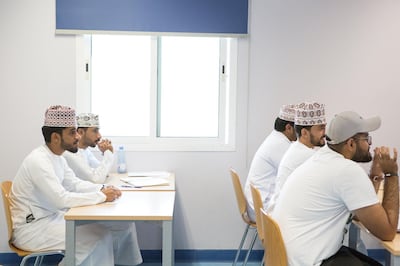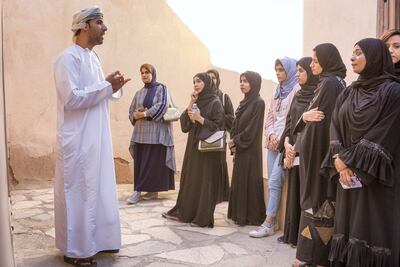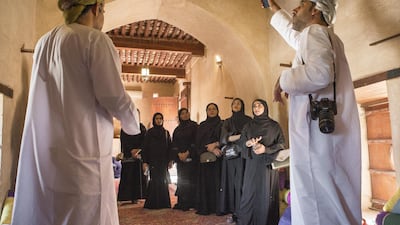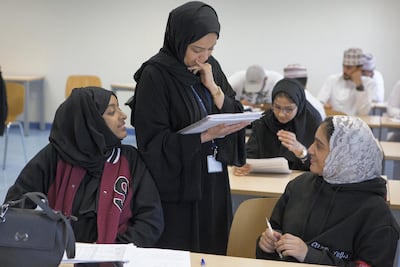Ambling between the sand-coloured buildings of Nakhal Fort in north Oman, a hospitality professor instructs his students on how to become successful tour guides.
The group is comprised only of Omani women – a scene deemed unusual in a country where foreigners vastly outnumber locals in the private sector.
The 10 female students walk across the pre-Islamic fortification, some in the black flowing over-garment typical of the region and others in brighter colours. All listening attentively to their professor. “The tourists you will guide are often elderly, don’t hurry them,” he tells the young women.
Omani parents once discouraged their children from working in the tourism industry – an activity often associated with nightlife, alcohol and moral decay. Instead, they pushed for jobs in the public sector, or the profitable oil industry.
This shifted when the Omani government in March 2016 announced a plan to create 500,000 new jobs in the tourism industry by 2040 and that 70 per cent of the positions would go to local men and women.
In a country where the number of unemployed graduates is nearly 60,000 and expatriates account for more than 87 per cent of the private sector, young men and women jumped at the opportunity.
_______________
Read more:
Oman's economy to grow faster this year and next as energy exports rise
Omani women call time on workplace discrimination
Oman nationalisation drive threatens thousands of expats' jobs
Can Oman business loans save young people from unemployment line?
_______________
Sector growth is key in motivating students, explained Dr Abdulkarim bin Sultan Al Mughairi, the Dean of the Oman Tourism College (OTC), the sultanate’s only academic institution specialising in tourism.
Established in 2001 in Muscat, the college aims to professionalise all components of the labour force – from tour guides and chefs to managers and receptionists. To date, 818 full-time students have enrolled, twice as many as in 2013, in addition to the 300 attending one-day programmes and short courses. The college aims to offer Russian lessons – on top of English, French and German – to cater to the growing number of Russian tourists in the country.
Since its establishment in 2004, the Ministry of Tourism has marketed Oman as the hidden jewel of the Arabian Peninsula, blessed with rocky mountains, wind-swept deserts and a 3,165 kilometres-long coastline. In 2017, 3.3 million tourists visited the sultanate, an additional 1 million compared to a decade earlier.
By 2040 the tourism industry is expected to account for six per cent of Oman's GDP and play a major role in job creation for Omani nationals. "A $110 million hotel would create 300 jobs, just like a $7 billion oil refinery," Director General of Tourism Promotion Salim Aday Al Mamari, told The National.

However, explains OTC professor Bader Thuhli, there is a stark lack of interest in learning foreign languages, just one in a number of hurdles for the new industry. Hospitality professionals believe the sector as a whole needs improvement in order to better promote Omani culture, hospitality and nature. “Some guides shout at hard of hearing tourists, we need to teach them patience,” explains Mr Thuhli.
Last year the number of government-licenced tour guides was 340, including 15 female tour guides – in the first ever attempt to increase the presence of women in the workplace. Mr Thuhli believes that tour guiding is one of the few sectors in hospitality that can be 100 per cent Omanised.
Sara Al Balushi, 34, a divorcee enrolled at the Oman Tourism College hopes to begin work as a tour guide in addition to her job at the Ministry of Defence. “I want to do some missions to help support myself,” she said, standing in Nakhal Fort.
A stone’s throw away, a group of students take selfies – seemingly less interested in their professor, who invites them to interact in English with a group of European tourists visiting the fort.
"Foreign workers are being employed to work, but also to train Omanis to replace them in the long term," Salim Abdulaziz Al Mashiki, General Manager of Employment Department at the Ministry of Manpower, tells The National.
Disillusion among younger Omanis came to a head in January last year when hundreds took to the streets to protest against unemployment, with some accusing the government of making empty promises.

The government has since made an aggressive push to nationalise the workplace, with a temporary ban on hiring foreigners and setting a quota for how many locals need to be hired. The tourism industry aims to employ 70 per cent locals by 2040, compared to its 32 per cent in 2018.
Some Omanis are hopeful – confident that hospitality could be the answer to the country’s unemployment crisis. “The sector is promising [because] more jobs will be allocated to us,” said 20-year-old OTC student Amel Al Zadjali.
“Honestly, I was somewhat sceptical about the tourism industry, but my family encouraged me to give it a try. And they were right, I learned a lot and acquired many skills."


